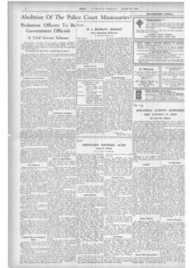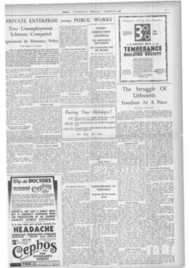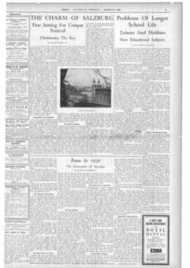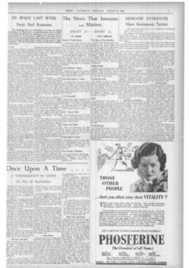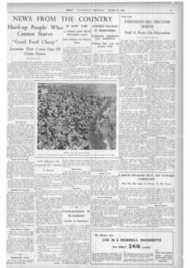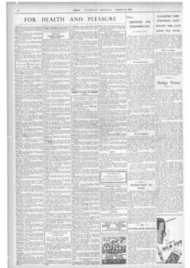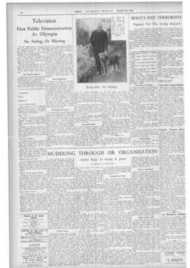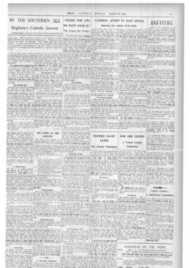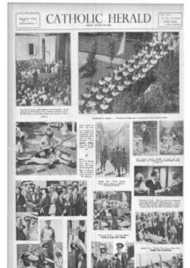Page 9, 28th August 1936
Page 9
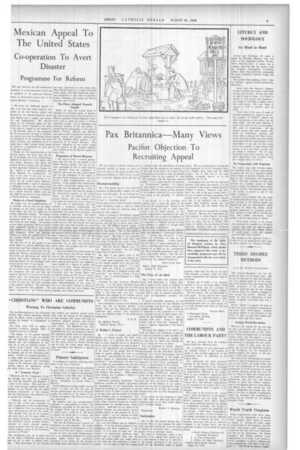
Report an error
Noticed an error on this page?If you've noticed an error in this article please click here to report it.
Tags
Share
Related articles
The Recruiting Discussion
Pax Britannica
Recruiting And
Pax Britannica
Peace, Priests And People
Pax Britannica Many Views
Pacifist Objection To Recruiting Appeal
[We give below a selection from a considerable number of letters we have received in reply to the appeal of Mgr. Dey, Bishop-in-Ordinary to H.M. Forces, to join the Territorials, Regular Army and Navy.]
Misunderstanding
SIR,—The greater part of your editorial comment on Bishop Dey's appeal was well away from the point. In an involved sentence you say, " it does seem disturbing to hear a recruiting speech ' . . . . whose special note is that Christians should make themselves ready to fight in order to thank the State for allowing them to practice their religion."
There is nothing in the Bishop's appeal which would justify your calling attention so prominently. to the motive of thanksgiving, and still less 1.9 justify your assertion that te. giSfioja himself makes a Special note of it. You were possibly misled by the words: " We in this" couhtry have good reason to be grateful for our happy state." The idea is not expanded and you are taking far more than you are given if you do not read it only as a parenthetical Deo Gratias. Hence when you " find this motive difficult, even (?) on reflection, to accept " you are being impertinent in both senses.
But there is one special note in the appeal. You have it in such phrases as: " it would seem reasonable that Catholics in the Empire should strive that this fortunate condition may endure." "it is also very much our interest as Catholics to make the influence of England strong and powerful," " an obvious measure of prudence,and " a strong England is a help to the Church."
Confused by your irrelevant difficulty you say, " it is the State's minimum duty to render to God the things that are God's arid we owe it no gratitude for doing so." Then a few lines later you say, " as Britishers who happen to be Catholics we do owe our country affection and gratitude." The distinction is idle.
Your immediate reaction to the Bishop's letter was one of distaste, perhaps a further bout of his apparently unusual reflection may transfer your reactions from the editorial senses to the editorial intelligence.
B. R. B. The Hellenic • Society, Bedford Square, W.C.I.
A Mother's Protest
SIR, — 1 write, as mother and grandmother, to protest against the letter of Bishop Dey. Is it possible that in these days an army chaplain can be so ignorant of the nature of modern war and so ignorant of the degradation and powerlessness of the masses of our people that he can think of anyone joining the army as an " adventure " and describe the state of our country simply as " unfortunate economic conditions ''? An adventure! To learn not how to fight as a man against men, but how to destroy and blast a country with explosives and to kill and maim men, women and children with poison. Many people think modern war is murder; 1 think it is low and filthy murder.
Unfortunate economic conditions! The deliberate sacrifice of English agriculture, the depopulation of our countryside, the monstrous herding of a proletariat in our industrial towns in order to suck the bulk of foreign trade and the profits of foreign money-lending, and, in consequence, the necessity of gigantic armaments to protect trade routes—taxation heaped on taxation, unemployment on unemployment, misery on misery. And then we are asked to be thankful because our government "grants complete liberty to the practice of all religious beliefs "—we are allowed to build pretty gothic churches and can buy rosary beads for one penny.
Sir, I see my children and my children's children. I see the darling children of my neighbours and their neighbours. I ask myself : Is it in order to enjoy the " adventure " of distributing explosives and poisons that we brought them into the world and tended them and taught them to love God and their neighbour as themselves? Is it in order to swell the .volume of foreign trade, the distribution of cheap rubbish (and the machinery for making it) to the ends of the earth—the land of England going to grass and to waste, the plough forgotten—that we are expected to bear " the heartache and the thousand natural shocks "? Is it surprising that the practice of " birth-control " spreads? Is it decent to urge people to have children in modern England, with the almost certain prospect of an inhuman industrial life and a premature death in the shambles of modern war'?
I ask myself : Is it the function of Catholics thus to play the game of the lords and the money-lords? Would it not be more seemly as well as more holy, would it not be better politics, if our pastors (shepherds!) remembered the land and used their not yet quite lost influence to further the growing of good and the revival of a peasantry in England instead of using that influence in support of foreign trade and increased armaments?
Sir, in your—comment on thc bishop's letter you .describe a " theoretical alternative." I accept that alternative. 1 don't believe our institutions are sane or our ideals decently human. I don't believe that the desire for peace expressed by our rulers is anything more than a desire to be allowed to sit tight on our accumulated and often ill-gotten possessions and I believe, with Father Prince, " that the antiGod of Lenin was a reaction not against Christianity but pseudo-Christianity."
MARY ETHEL GILL.
Pigotts, High Wycombe. August 24, 1936.
The Price of an Ideal
SIR,—I must admit sane surprise cornbined with admiration at finding Mgr. Dey's appeal to the youth of England to join the armed forces of the Crown. But— time may, of course, prove me wrong—I look with a sense of pleased anticipation to your correspondence columns this week.
It seems impossible, nowadays, to find an idealist who does not take idealism to mean pacifism and this to be a synonym of complete disarmament. There would be no objection to this confusion if it were not confined severely to these shores. Germany has just doubled her army. Italy is bristling with arms. France is heavily armed, and we have first witnessed the result of military impotence in the Italian aggression.
The plain fact appears to he that if we wish our ideals, our civilisation to prevail, we must be prepared to make sacrifices for it, even the last sacrifice—of yielding up our own lives or, worse still, running the risk of taking the lives of others.
The last statesman to declare himself, though a pacifist, no believer in unilateral disarmament was Mr. Tom Shaw, the War Minister of a Labour Government; and so pronounced a supporter of the League as Sir Alfred Zirnmern publicly stated his disapproval of Lord Cecil's propaganda in favour of disarmament in this country.
The establishment of the standing army for service at home and abroad (except in India), is about 150,000 men. Hitler's new army will be about seven times as large. It seems to me absurd to suggest that an army like ours can even be described as adequate to the defence of our country, much less to assist in assuring the reign of law which all of us hope the League of Nations may come to wield throughout the world.
11 our youth are not prepared to fight for their ideals we shall soon find others imposing upon us an ideal which offends every civilised instinct.
HUBERT F. HAWKER.
Hampstead.
Nationalism
SIR,—It was with mixed feelings that I read the above in your columns this week. and I am quite certain that I am not alone in finding so distasteful such a recruiting appeal from an episcopal source.
The spirit of nationalism which is the keynote of the appeal must indeed serve as a cold douche to those of us who find it the logical conclusion of our Faith to work for the discredited cause of world peace. We are accustomed to having our task hardened for us by European dictators, English press lords and Mr. Duff Cooper; but to find one of our own Bishops arraigned against us is the unkindest cut of all.
To propagate the view that our increased defences spell peace and security is to tell the people of this country something which frankly is untrue.. Whatever may have been the case in the past, to-day there is no way to peace through armaments. The strong man's armour, efficacious though it was in the psalmist's era, is useless against high explosive, poison gas and typhoid germs that are rained from the air.
Peace can only be obtained by a League of Nations. Because this experiment, the most gigantic in world history, has failed once it is no reason to discard it., We must try again and go on fqing. The causes of conflict, the distribution of raw materials, markets, and the territorial adjustments concomitant upon population
growths, these must be and can be dealt with through a League, while the other causes, imperialism and jingoism must be exorcised.
Perhaps the C.Y.M.S., if its branches consent to act as recruiting offices would also very kindly put up a League of Nations poster beside its military appeal?
We want peace. We are determined to have peace. To this end we must regard the world as an indivisible whole, a commonwealth based on co-operation. It is internationalism that we must preach for it is only through such shall we find any real security.
FRANCIS HUNT, 9, Washington Road, Caversham, Reading.
August 22, 1936.
COMMUNISTS AND THE LABOUR PARTY
We have received from the Catholic Social Guild the following letter:
SIR,—A question of vital importance to the Catholic Church in this country is raised by the renewed application of the Communist Party for affiliation to the Labour Party.
This application has been decisively rejected by the Labour Party Executive, but the Communist. Party has succeeded in persuading a large number (over 1,200) of organisations affiliated to the Labour Party to pass resolutions supporting their application. It is also organising a petition, to be signed by members of the Labour Party and affiliated organisations, to be presented to the Labour Party Conference in October next, in support of its demand..
This is part of the tactics of the united front," which the Secretary of the Komintern (Dimitrov) and the leader of the 'British Communist Party (Harry Pollitt) have openly declared represent no change in Communist principles, but merely a bold attempt to capture the leadership of the workers. Under these circumstances, it is clearly the duty of every Catholic in the Labour movement to use any influence he may have to frustrate this plan. If it succeeds, there may soon be no room for Catholics in the Labour Party, and the experience of Spain will be shared by Great Britain.
+ JOSEPH, Bishop of Hexham and Newcastle (President), L. A. TOKE (Chairman),
L. O'Hea, S.J. (Hon. Secretary). Catholic Social Guild, Oxford.
August 24, 1936.
blog comments powered by Disqus



